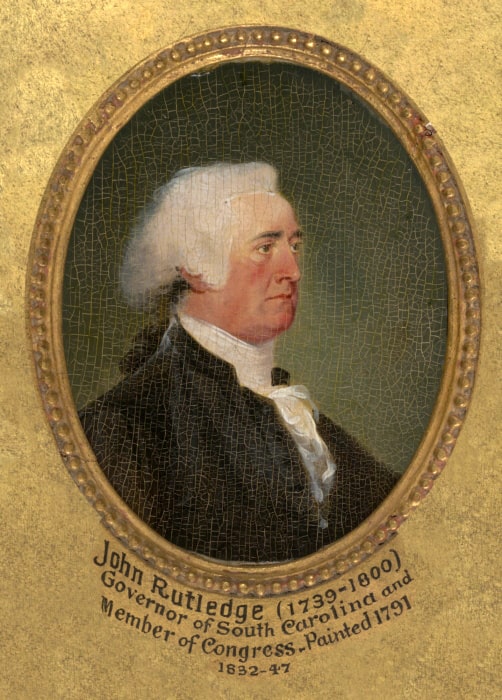Contents

Contents
Quick facts
- Born: 17 September 1739 in Charleston, South Carolina.
- As Governor of South Carolina (1779 – 82) when the War moved South, he had such broad emergency powers and provided such singular leadership that he is called
Dictator Rutledge.
- After the Siege of Charleston (1780) when the British captured the American army, Governor Rutledge escaped capture by fleeing to North Carolina. The British seize all his property.
- In 1785 Rutledge becomes a founding trustee of the College of Charleston (1785).
- At the Constitutional Convention (1789), Rutledge was one of the most influential delegates. He served on five committees, chaired the Committee of Detail — and was an able defender of southern interests.
- During his years as Associate Justice of the U.S. Supreme Court (1789 – 91), Rutledge traveled great distances to fulfill his duties as a judge on the southern circuit; the Court, however, heard no cases during its first two years.
- After the death of his wife Elizabeth (1792), Rutledge, certainly depressed, seemed to begin a mental decline.
- In a recess appointment in June 1975, President Washington nominated Rutledge to be Chief Justice of the Supreme Court; the Senate did not take up the nomination until December.
- Died: 23 July 1800 in Charleston.
- Buried at St. Michael’s Episcopal Church in Charleston.
Biography
John Rutledge, American jurist and politician, was born in 1739 into a prominent family in Charleston, South Carolina. The eldest of seven children — and the brother of Edward Rutledge, a signer of the Declaration of Independence — his father was a physician of Scots-Irish descent; his mother was English. He began the study of law in Charleston, furthered his education in London, was admitted to the English bar in 1760, and returned to Charleston in 1761 to establish his practice.
During the Revolution Rutledge was politically active at both the national and state levels. He was a delegate to the Stamp Act Congress (1765), the First Continental Congress (1774), and the Second Continental Congress (1775 – 76; 1782 – 83). In South Carolina he was chairman of the committee which framed the state constitution (1776) and the first president (governor) of South Carolina (1776 – 78). Disapproving of certain changes in the constitution he resigned in 1778, but was elected again the following year and served until 1782.
From 1784 to 1789 he was a member of the State Court of Chancery.
At the Constitutional Convention of 1787 he urged that the president and federal judges be chosen by Congress — preferably by the Senate alone — and that the president should be chosen for a single term of seven years. And when the Constitution was up for ratification in his home state, he was a vigorous champion of adoption.
When the new government was formed President Washington appointed Rutledge Associate Justice of the U.S. Supreme Court (1789 – 91), but since the Court heard no cases in its first two years and there was little to do, he resigned, to serve as Chief Justice of the South Carolina Supreme Court (1791 – 95). In 1795 Washington nominated him to the position he had sought all along — Chief Justice of the U.S. Supreme Court. However, because of his wildly outspoken objections to the Jay Treaty — he called it prostitution
— he presided only during the August term; the Senate refused to confirm him.
On hearing the news that he was not to be made Chief Justice, he attempted suicide by jumping off a wharf into the Charleston Bay. His public career over, his mind failing, Rutledge died in Charleston in 1800.

